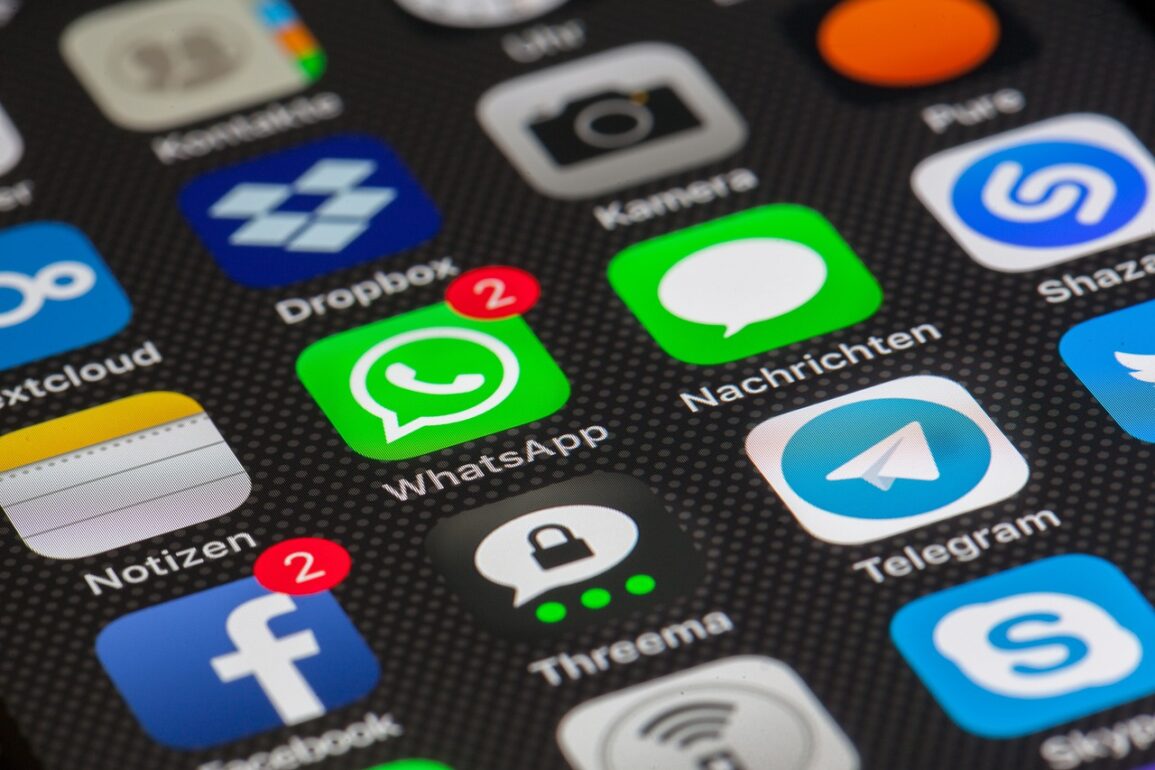This creates an interesting situation where, while we all spend time on social media to some extent, we also almost all complain about it in the second sequence. Being afraid of social media is a bit of a status thing nowadays: few people would admit that they just enjoy scrolling through Instagram for five hours straight; on the contrary, critiquing social media can make each of us feel like a better person.
Our individual fears then translate to the societal level – Facebook and Twitter (X) are the subjects of many political discussions on topics such as the polarisation of society or the spread of misinformation, and Instagram is mentioned in relation to the deteriorating mental health of teenagers.
But the question remains whether all these concerns are based on a real understanding of what social networks do or do not do to us. And if they are not, then where does the fear come from and what does it mean?
The enemy of TikTok
An example of the (not only) moral panic around social networking is the current controversy around the TikTok platform. It has resulted, among other things, in the European Parliament and subsequently the Czech National Authority for Cyber and Information Security banning TikTok for those users who use devices belonging to the government or important critical infrastructure bodies.
The debate about TikTok must be distinguished from similar debates about, for example, Meta (formerly Facebook) applications, because TikTok’s parent company is based in China and concerns about the Chinese government’s handling of user data are of course valid. But the security and highly political aspect of the debate (which is primarily a debate about relations with China) has been mixed in the media and public space with a general fear of what the ubiquitous networks and their omnipotent algorithms can do.
Thus, even in the reputable Czech media, the news that TikTok produces harmful and manipulative videos tailored to Western teenagers while educating Chinese children was discussed quite seriously – it is not without interest that this claim is also contained, for example, in an educational video by People in Need, which is included in a series of educational materials on media literacy and the fight against disinformation. However, the aforementioned message is nothing but disinformation.
There’s no real evidence that TikTok’s algorithm produces any videos “tailored” to Western users – TikTok just uses different filters for moderation than its Chinese counterpart Douyin, because it’s simply an app designed for a different market.
A common example is the self-harm videos that are allegedly deliberately intended to spread among children in Europe and the US in order to disrupt Western civilisation. But these are not produced by TikTok, but by the users themselves, and the videos are spread mainly because other users are interested (platforms like Instagram or Tumblr also have a similar problem, and good old blogs had it in their day, for example).
Similarly, in the aforementioned video by Člověk v tísni – and on the pages of reputable Czech media – the information that TikTok saves all your photos, passwords, and even fingerprints is being shared. Most of the available studies and data (see, for example, an expert article from the Georgia Institute of Technology TikTok and US National Security) agree that TikTok stores the same data as other applications we commonly use (such as those from Meta or Google). If TikTok were to breach user privacy in the way described, it would probably have been banned across the EU long ago.
Incidentally, TikTok representatives are now in intense negotiations with the European Commission about what changes the app needs to make to comply with the recently approved Digital Services Act. European Commissioner Thierry Breton says TikTok is devoting a lot of attention and resources to this, and is working intensively with the commission – while Meta’s new Threads app has not (yet) passed through that net.
In short, facts are subordinated to emotions in the TikTok debate, and the main one here is concern for one’s own safety (national and individual). This illustrates very well the two levels of panic around social networks – concerns about our psyche, mental health, interpersonal relationships and our humanity in general on the one hand, and on the other hand concerns about the functioning of society, democracy, the media system and trust in the state and its institutions.
Facebook and the end of democracy?
However, it is rather difficult to know whether or not these concerns have a real basis – the impact of social networks on society is extremely difficult to measure empirically, for several reasons.
A very simplistic explanation of the methodological difficulties of such measurement is that in order to be able to measure the impact of social networks on various social processes in a truly conclusive way, we would ideally need a control group of people who are excluded from this impact – and of course we don’t have one.
Moreover, while political polarisation, for example, is undoubtedly influenced by social networks, it is also influenced by many other things: economic crises, pandemics, war and social inequalities. And all these things are in turn influenced by how we discuss them on social networks.
In their recently published study A Review and Provocation: On Polarization and Platforms, American researchers Daniel Kreiss and Shannon McGregor argue that research on the role of platforms like Facebook or Twitter (X) in political polarization completely overlooks the important category of inequality.
They point out that, for example, the Black Lives Matter movement, which has spread massively on social media, is polarizing society not because so many people have a loud voice to speak out, but because it gives voice to previously under-heard groups in society.
What is causing the polarization to deepen is not the fact that we are all discussing racism on Twitter, but the fact that Twitter, among other things, has helped make visible the injustices that African Americans have long faced – the platform is thus a tool (and one of many at that), but not the cause of polarization. The cause is long-standing unaddressed social inequalities.
A similar conclusion, albeit framed differently in theory, is reached in a 2021 study published in the journal Nature – in which the authors measured the degree of political polarization on the Reddit platform and concluded that the shift to more radical views is not happening at the individual level and is not happening through the platform itself; the cause here is an influx of new users who come to the platform with a radical opinion already formed elsewhere (the researchers observed this using the 2016 US presidential election as an example).
In other words: platforms don’t polarize people, people polarize platforms.
And these conclusions are, after all, confirmed by recently published studies on Facebook and Instagram, in which the company behind these networks, Meta, was involved and the researchers had unprecedented access to the data – these studies do not address the theoretical reasons for the polarisation, but they make it quite clear that the blame cannot be clearly placed on the platforms and their algorithms.
Of course, it cannot be argued that social networks do not play any role and do not influence our political debate in any way – even by mere lay, unscientific observation, we can see that political communication is shifting significantly because of the internet. After all, the Czech political scene has produced both the Facebook show Čau lidi and the now cult phrase “write me in the comments”, and there is no doubt that for populists, for example, social networks are a powerful tool.
At the same time, we cannot say that we have clear empirical evidence for the claim that social networks cause polarisation in society.
Nevertheless, journalists, politicians and often media-savvy pundits alike blame social networks. The tendency to look for a culprit that we can simply point the finger at prevents us from seeing the situation soberly and addressing current problems, such as the aforementioned spread of disinformation.
We tend to see disinformation as another consequence of the existence of social networks and blame algorithms for spreading it.
However, if we look again at the data (for example, the study published this year by Sacha Altay and Manon Berrich), we find that misinformation actually makes up a very small percentage of the content on the networks, does not spread as quickly as we think, and is not believed by nearly as many people. Again, this is not to conclude that social networks play no role here – but if we focus only on them, we will miss the real reasons why misinformation exists and why people believe it.
Another problem with research on the social impact of social networks is its focus on English-speaking countries in the so-called West. Studies from other countries do exist, but they are far fewer in number, and the findings of what and how it works in the US are therefore often taken as universal.
However, the platforms are not the same everywhere. Their infrastructure may be global, but how debate develops on them and what they are actually used for is largely influenced by culture and social norms – anthropologist Daniel Miller thus speaks of the “local invention of the internet”, pointing out that Facebook in Indonesia, for example, is not the same as Facebook in Washington.
Mental well-being on networks
The problem of Eurocentrism also relates to the second level mentioned: the impact of social networks on individual lives, especially in relation to mental health.
Probably the most successful attempt to overcome the methodological difficulties mentioned above has been made by researchers at Oxford University’s Internet Institute. A few days ago, they published a ground-breaking study that collected data from nearly a million Facebook users in 72 countries over several years. The conclusion is that the link between Facebook use and psychological distress cannot be proven.
One of the authors of the study even cautiously says that some of the data analysed suggests that the effect may be the opposite, i.e. that Facebook may have a positive effect on the psyche.
This claim was made in 2014 by a media theoretician known as Danah Boyd in a book published in Czech under the title It’s More Complex. The social life of teenagers on networks. Her study is also quite rare in that it was qualitative research that did not simply measure data from networks. The author actually spent time with teenagers from different strata of American society over a period of eight years and conducted hundreds of hours of interviews with them.
And, as the title of her book suggests, she concludes that myths like the Internet’s effect on teenagers’ self-harm, self-esteem, and attention span are simply more complex – and that, for example, for less popular kids with specific interests and hobbies, social networking sites are instead very positive, because they allow them to find other people with similar interests and feel less lonely.
The topic of social networking and teenagers’ mental health was also recently the subject of a long and thorough article in The Atlantic magazine, which summarises the available studies.
Kaitlyn Tiffany’s text, No One Knows Exactly What Social Media Is Doing to Teens, highlights two interesting aspects that emerge from current knowledge.
First, our experience on social media is most influenced by how we ourselves approach it. So the idea that social networking has a negative impact on us leads to the assumption that it does – conversely, for people who don’t have this assumption, the experience can be positive and for many of us, simply neutral.
And the second interesting point is that a lot of the studies focus on teenage girls, and they are often portrayed as an extremely vulnerable group.
Tiffany concludes by quoting experts who advise – fear gets you nowhere, restriction doesn’t get you anywhere, if you want to protect your children, talk to them about it and then spend time online together.
Are we less or more human?
If we look at the available data and base it on what we can actually measure and prove, most of our fears about the online world will turn out to be unfounded. Yet we are afraid.
Yet the pervasive collective fear that the internet is robbing us of our ability to discuss and engage in meaningful relationships with other people can be summed up in the deep-seated fear that the internet is taking away our authenticity and humanity.
But we can’t brush this fear off as not based in reality – it’s an important statement about how we feel in the world of social media, and it has as much impact on the workings of society as objectively measurable metrics that might refute our fears.
The aforementioned anthropologist Daniel Miller speaks of the “fetishization of humanity” in relation to humanity and the internet, and offers an interesting metaphor – we all accepted decades ago that the functioning of us as individuals, people and our brains can be altered through chemicals, and that something as visceral and deeply human as the experience of sadness or depression can go away through antidepressants, alcohol or any other substance. However, we reject and dread the idea that our brains are equally susceptible to manipulation through algorithms.
We don’t feel that antidepressants, alcohol or caffeine take away our humanity, even though they fundamentally change how we think and function. But social networks and their algorithms are, in the popular imagination, taking away our humanity. Why?
What we are actually afraid of, and what it says about how we are, want to be, and can be human, is perhaps ultimately the most interesting question.








